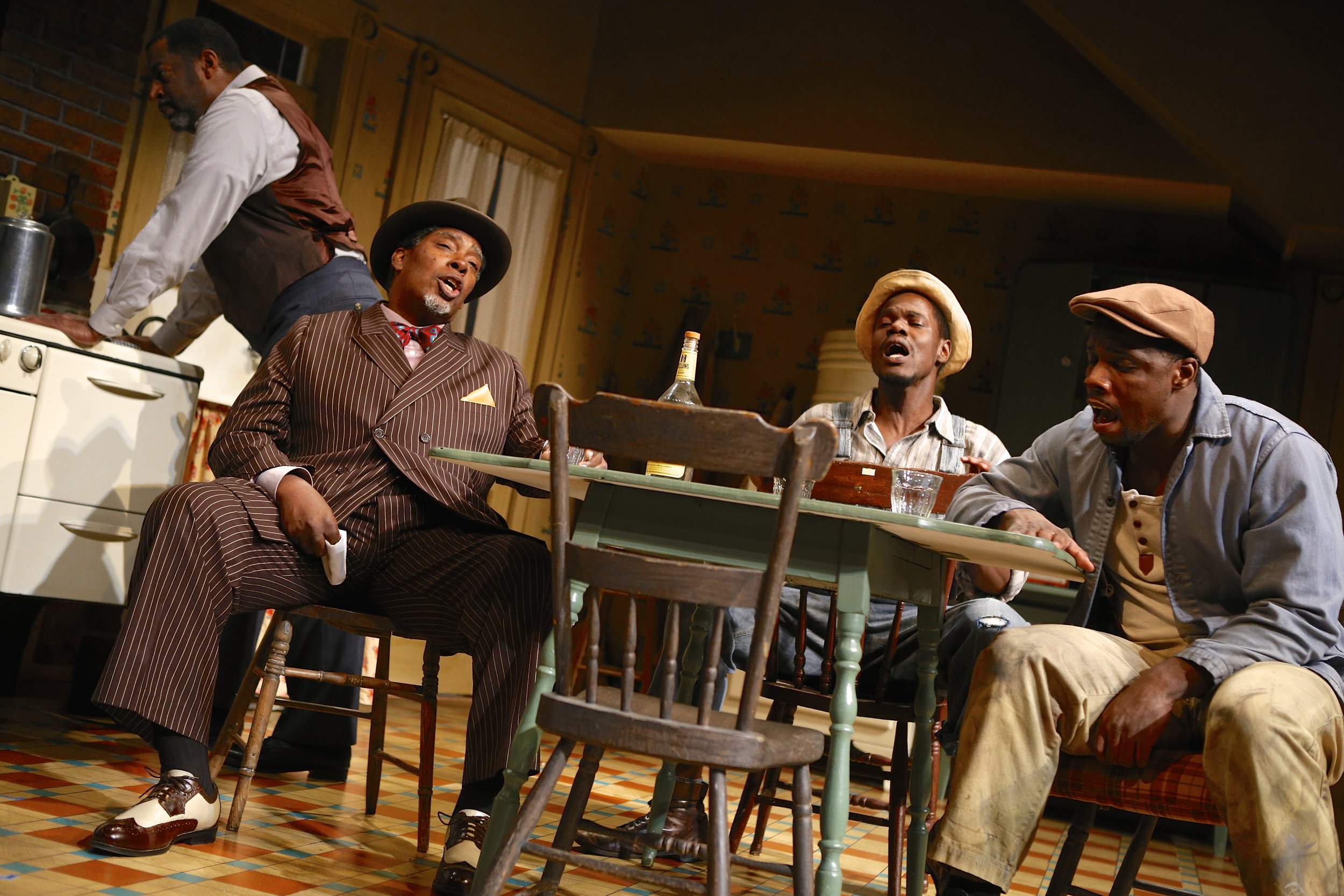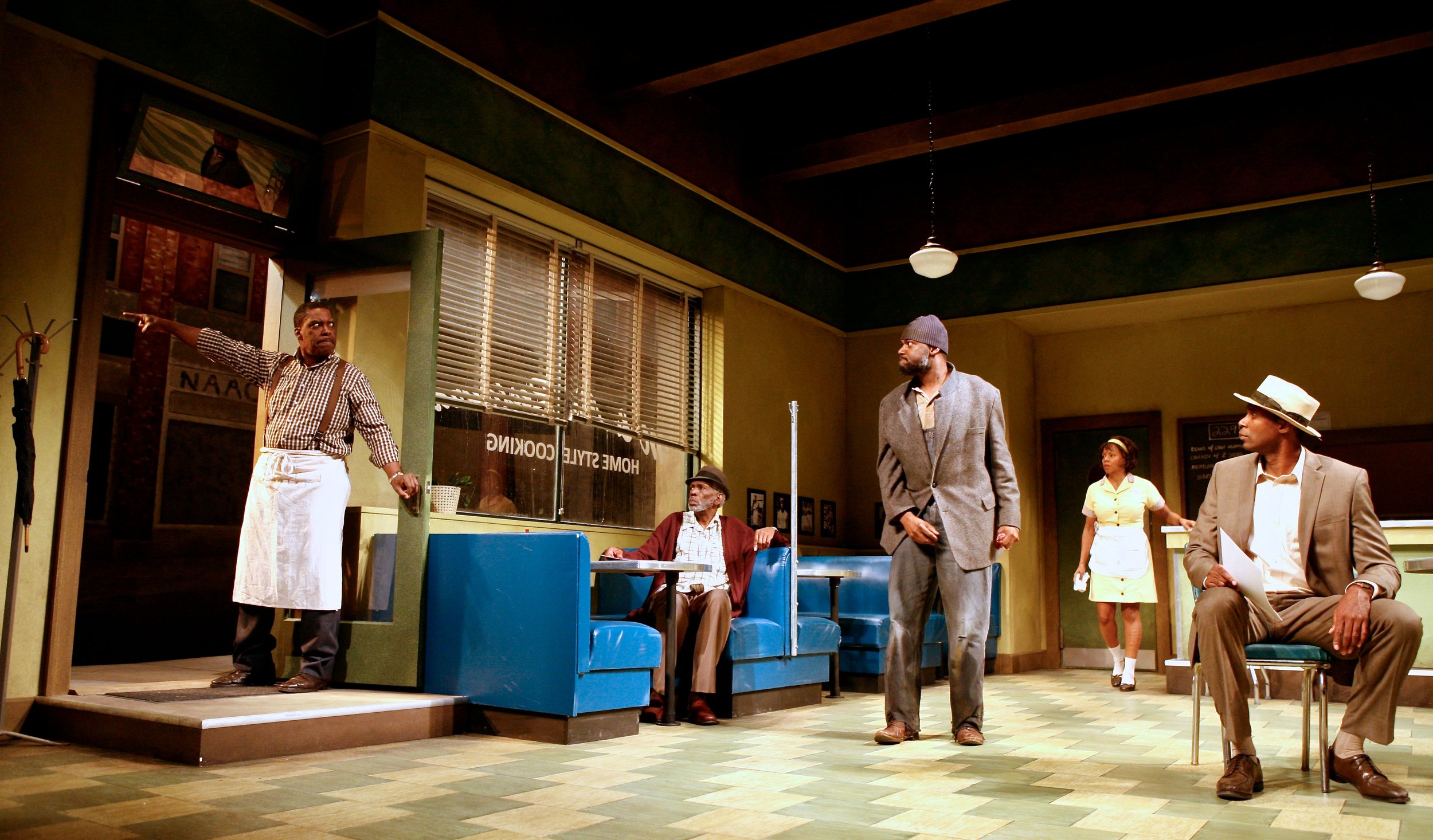
TIMOTHY BOND BECOMES STAGE’S 4TH ARTISTIC LEADER
Cast of Ma Rainey’s Black Bottom . Season: 2008-09. Director: Tim Bond.
Photo: T. Charles Erickson
Timothy Bond
Reaffirming the adage that things are quicker said than done, Bob Moss and Jim Clark remained at Stage for most of the next two seasons while the searches for their successors progressed. In the course of the next two seasons, Moss would direct five plays beginning with a beautifully realized production of Driving Miss Daisy starring Elizabeth Franz and William Charles Mitchell. Later in the 2006/07 season he undertook Theresa Rebeck’s Spike Heels and the Agatha Christie mystery The Unexpected Guest. Moss then planned the 2007/2008 season. To open, he directed Christopher Hampton’s Les Liaisons Dangereuses and later Martin McDonagh’s comic bloodbath The Lieutenant of Inishmore. Then, with a successor in place and the theatre in good hands, Moss made his exit, as graciously as he had entered with good will, gratitude, and appreciation for the audience, artists, and staff.
The good hands entrusted with the artistic future of Syracuse Stage belonged to Timothy Bond, a twenty-four-year veteran of regional theatre. Bond had served as artistic director of Seattle’s Group Theatre, and for the 11 years prior to his arrival at Stage as an associate artistic director at the Oregon Shakespeare Festival. Bond’s career had brought him to many of the country’s leading regional theatres including The Guthrie, Actors Theatre of Louisville, Milwaukee Repertory Theatre, Cleveland Play House, ACT, and Indiana Repertory Theatre, among others.
Jessica Bues and John G. Preston in Les Liaisons Dangereuses. Season: 2007 - 2008. Director: Robert Moss
Bond expressed a keen eagerness to begin his work at Stage and the Department of Drama. “I look forward to engaging what I know to be the generous Syracuse Stage audience and community. The opportunity to lead a professional theatre as well as a strong university drama program is an exciting chance to develop new work, reach new audiences, and infuse the next generation of theatre artists with a firm sense of purpose and professionalism. I believe in the power of theatre to be a transformative force in our society. It brings people from diverse backgrounds together under one roof to be engaged in democratic dialogue about important societal and interpersonal concerns in theatrical and entertaining ways.”
The first task for the new producing artistic director was to begin the selection process for the 2008/09 season, which he promised would be “a mix of classical plays, contemporary plays, new plays and plays with music.” Bond’s influences derived from a broad spectrum of theatrical performance, what he called “the wonderful mélange of styles and ideas” that have shaped theatre through time and across cultures, and he wanted Stage’s season to reflect that richness. He had a good idea of how he wanted to start, with a playwright whose work was near and dear to his heart, August Wilson.
Playwright August Wilson
While never claiming close friendship with the esteemed playwright, Bond had been more than an acquaintance with Wilson. While at the Oregon Shakespeare Festival in Ashland, Oregon, Bond had opportunities to visit with Wilson when the playwright would attend OSF productions. On occasion, Bond had the chance to hear the playwright’s work in progress, described by Wilson himself as if relating events he had witnessed or a conversation overheard. In addition, Bond had been an avid champion of Wilson’s Century Cycle, the series of ten plays that form a decade-by-decade chronicle of African American life through the last century. Bond considered the Cycle one of the most extraordinary achievements in playwriting. “It’s about all our histories no matter what your cultural background,” he said in a StageView interview. “These plays speak to you as a human being.”
Bond noted that Stage had produced four Wilson plays and that they had been well received— Fences, The Piano Lesson, Jitney, and Gem of the Ocean. Recognizing there was an audience for Wilson’s work, it occurred to him that he might build on Stage’s production history and complete the Cycle. It had been an ambition he harbored since Wilson’s passing in 2005. He knew just where to begin, where Wilson had, with Ma Rainey’s Black Bottom. Thus, the 2008/09 season began with Bond’s Stage directorial debut, and audiences were treated to a production of Ma Rainey’s Black Bottom with Ebony Jo–Ann in the title role and Thomas Jefferson Byrd as Toledo, a role for which he received a Tony nomination in 2003. (Tragically, Thomas Jefferson Byrd died in Atlanta from gunshot wounds in 2020. He was 70.) During his artistic tenure, Bond would also direct Wilson’s Fences, Radio Golf, Two Trains Running, and The Piano Lesson, making the tally seven out of the ten Cycle plays produced at Stage.

Derrick Lee Weeden, G. Valmont Thomas, Stephen Tyrone Williams and Yaegel T. Welch. "The Piano Lesson" Directed by Timothy Bond. Season 2014-15. Photo: Michael Davis

James A. Williams, Kim Staunton, & Craig Alan Edwards. "Fences" Season: 2009 - 10. Directed by Timothy Bond. Photo: Chris Bennion

The cast of "Two Trains Running" Directed by Timothy Bond. Season 2012-13. Photo: Michael Davis

Richard Brooks in "Radio Golf" Directed by Timothy Bond. Photo: T. Charles Erickson

The cast of "Ma Rainey's Black Bottom" Directed by Timothy Bond. Season 2008-09. Photo by T. Charles Erickson
In January of 2008, Jeffrey Woodward was hired as Stage’s new managing director, succeeding Jim Clark. As with Bond, Woodward brought a wealth of knowledge and experience to his new job having worked at such theatres as Hartford Stage, the Mark Taper Forum, Northlight Theatre, the Oregon Shakespeare Festival (not concurrent with Bond), and for seventeen years as the managing director of the McCarter Theatre Center in Princeton, New Jersey. During Woodward’s tenure at the McCarter with artistic director Emily Mann, the company became one of the leading regional theatres in the United States and in 1994 was honored with the Tony Award for Outstanding Regional Theatre.
In 2010, Ralph Zito was named chair of the Department of Drama, thereby completing the restructuring of leadership at Stage and Drama. Zito’s distinguished career in the academic and professional theatre worlds included 18 years at the Juilliard School, serving as chair of the voice and speech department for nine. He had served as a voice, text, and dialect consultant for numerous productions on and off Broadway and at many regional theatres. Zito’s appointment meant that Jim Clark was free of his obligations to Stage and Drama. Clark had remained at Stage until Woodward’s appointment and had served as co-chair of Drama with Maria Marrero until Zito arrived. Clark initially returned to the Drama faculty. A year later he became the associate dean for assessment and accreditation, then served temporarily as senior associate dean for academic affairs. He also directed the development of a new arts management curriculum in the Department of Drama.
Jeffrey Woodward
Ralph Zito
In nine full seasons, Bond produced an exceptional variety of plays and scored some notable firsts for Syracuse Stage. He introduced numerous directors and designers to the company as well as introducing exciting playwrights whose work had not yet been produced at Stage. Bond envisioned Syracuse Stage as a kind of “global village square” where the multiplicity of voices from within the Central New York Community and from places near and far would find expression. Perhaps no production better reflected this vision than Ping Chong’s Tales from the Salt City, an original documentary style performance based on the lives of seven Central New Yorkers whose personal tales embraced Sudan, Macedonia, Mexico, Cuba, Cambodia, The Onondaga Nation, and Syracuse. Chong returned in 2010 and 2012 to work on similarly styled piece Cry for Peace: Voices from the Congo, co-authored by Stage dramaturg Kyle Bass and developed in collaboration with Cyprien Mihigo and the Congolese Community of Central New York. The world premiere full production of Cry for Peace opened Stage’s 40th anniversary season in 2012 and was included in the 20th anniversary celebration of Chong’s Undesirable Elements series at New York’s La MaMa E.T.C. Chong received the National Medal of the Arts from President Barack Obama in September 2015.
Atandwa Kani and Mncedisi Shabangu in Sizwe Banzi is Dead. Season 2014-15. Directed by John Kani. Photographer Ruphin Coudyzer.
Tales from the Salt City Conceived and Directed by Ping Chong. Season 2008-09. Photo: Michael Davis
Sam Encarnacio, Rodrick Covington, Joshua Elijah Reese in The Brothers Size. Season 2011-12. Directed by Timothy Bond. Photo: T. Charles Erickson
Syracuse Stage realized its first ever international transfer when, in 2012, Bond’s production of Tarrell Alvin McCraney’s The Brothers Size moved from Syracuse to two theatres in South Africa, Cape Town’s Baxter Theatre and the famed Market Theatre in Johannesburg. In 2015, the Baxter sent its production of Athol Fugard, Winston Ntshona, and John Kani’s anti-apartheid protest play Sizwe Banzi is Dead to Syracuse Stage. (Kani shared the Best Actor Tony Award with Ntshona in 1972 for the Broadway production.)
Among the visiting directors new to Syracuse Stage were Bill Fennelly, Marcella Lorca, and Paul Barnes. Fennelly’s brightly colored and festive A Midsummer Night’s Dream marked the first non-musical co-production with the Department of Drama. Fennelly later directed a highly successful production of the musical Hairspray featuring Drama faculty member David Lowenstein as Edna Turnblad. Lowenstein would take on many roles in future holiday shows including Mrs. Trunchbull in Matilda The Musical. Lorca’s first production at Stage was a rare non-holiday musical, Tony Kushner’s and Jeanine Tessori’s Caroline, or Change, which featured outstanding performances by Greta Oglesby in the title role and by young local actor Seamus Gailor as Kushner’s stand-in Noah Gelman. Lorca would also direct the devasting political play Scorched by Wajdi Mouawad and Vanya and Sonia and Masha and Spike by Christopher Durang. Barnes’s Stage directorial debut represented another first for Syracuse Stage as his production of The Miracle Worker became Stage’s first audio described performance. Another local child actor, Jacqueline Baum, turned in an exceptional performance as Helen Keller. Barnes would return for two musicals, Irving Berlin’s White Christmas (a show with more than 200 costumes) and Peter Pan, and the mystery Deathtrap.
In 2015, Jeffrey Woodward was wooed away from Syracuse Stage by the Dallas Theatre Center. At the same time, Bond announced he, too, would be moving on, first to the University of Washington School of Drama where he served as head of the Professional Actors Training program. In 2020, he became artistic director of TheatreWorks Silicon Valley and in 2023 returned to Ashland to be the artistic director of the Oregon Shakespeare Festival.
Jamaal Wade, Anna O’Donoghue, and Jacqueline Baum The Miracle Worker. Season 2010-11. Directed by Paul Barnes. Photo: Michael Davis









